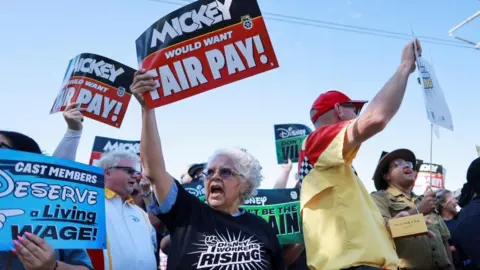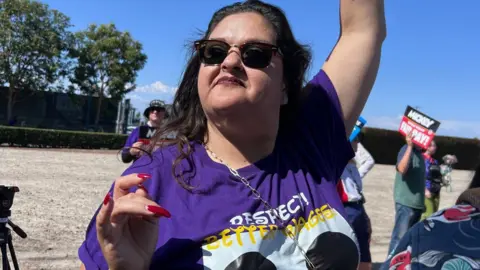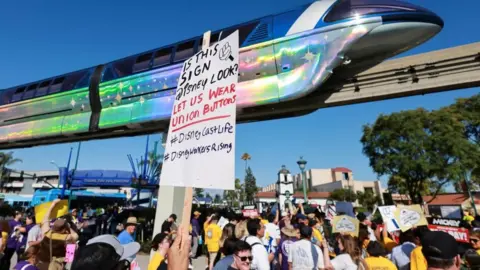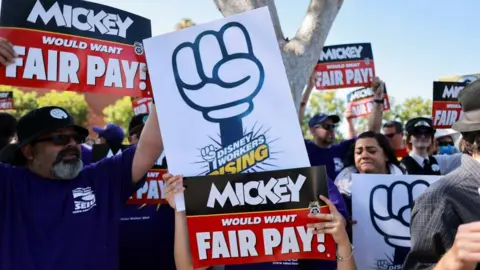By Regan Morris, BBC News, reporting from Anaheim, California
 Reuters
ReutersCynthia “Cyn” Carranza meticulously scavenged for a shady parking spot in the car she called home.
The overnight custodian at Disneyland has to sleep during the day – a difficulty for anyone, let alone when you’re living in your car with two dogs. Ms Carranza says she makes $20.65 an hour (about £15.99) at the park but last summer, she couldn’t afford rent in this Southern California city where the average apartment can run more than $2,000 (about £1,550) a month.
Ms Carranza teared up as she recounted the struggles of that summer, including sneaking for showers in Disneyland’s costume department. She now shares a small apartment with her boyfriend, who also works at the park, but still makes barely enough to make ends meet.
“That’s not something that anybody should experience working a full-time job for a company like Disney,” she told the BBC.
Ms Carranza, like others who work at the park, detailed to the BBC the financial hardships that come with working at what’s supposed to be the “Happiest Place on Earth”. About 10,000 union workers at Disneyland – the first of 12 parks created around the globe – are threatening to strike over the wages and what they say are retaliatory anti-union practices.
Hundreds of workers protested outside the park this week, with an array of signs and pins showing Mickey Mouse’s gloved fist in defiance.
“Mickey would want fair pay,” workers chanted outside Disneyland near the park’s gates.
They voted almost unanimously to authorise strike action on Friday, just days before union contract negotiations for workers are set to resume.
While the vote does not mean a strike is imminent, it could set workers up to act quickly if negotiations sour. Authorisation also gives the unions leverage as talks with Disney management continue again next week.

The contract for cast members at Disneyland expired 16 June, and the current negotiations involves a coalition of unions that represent nearly 10,000 employees at the park, which includes everyone from those who work as characters and operate rides to sales, restaurant, and janitorial workers.
Union officials say about one in 10 Disneyland cast members have experienced homelessness while working at the park. A survey of employees showed 73% say they don’t make enough to cover basic expenses each month and about a third said they experienced housing insecurity within the last year.
“We’re the ones who make the magic,” says L Slaughter, a host at the Toontown-themed part of the park. “We need Disney to pay us a liveable wage.”
Ms Slaughter spent two years living in her car while working at the park. She now has a small apartment about an hour’s drive from Disneyland.
She spent a lot of that time trying to find a safe parking spot to sleep, she says, adding that staff are not allowed to sleep in the Disneyland parking lots.
“My rent just went up $200 and I won’t be able to make rent again,” she says.
 Reuters
ReutersMs Slaughter makes $19.90 an hour – thanks to a minimum wage mandate passed by city voters in 2018. Disney unsuccessfully fought the wage hike, but workers say it’s still not enough to survive in Southern California.
A living wage calculator built by the Massachusetts Institute of Technology, or MIT, says a single person with no children would need to be paid $30.48 an hour to afford to live near Disneyland in Orange County, which is about 30 miles southeast of Los Angeles.
Workers who talked to the BBC said they have kept their jobs at the park because they love the Disney brand, and they rely on the generous healthcare benefits and union-operated food bank, which some workers described as a saving-grace.
Disney says it is committed to negotiations with its “cast members” – the company’s term for employees who play princesses and pirates as well as the chefs or janitors who maintain the park.
“We respect and value our cast members and recognize the important role they play in creating happiness for our guests,” Disney said in a statement, adding that talks with the unions representing its workers will resume 22 July and they are committed to reaching a deal “that focuses on what matters most to our current cast members, helps us attract new cast, and positions Disneyland Resort for growth and the creation of more jobs”.
The last Disneyland strike was in 1984, and it lasted 22 days.
Ms Carranza described the back-breaking work she does nightly at the park – cleaning, polishing, repairing floors and sometimes installing carpets.
She said last summer living in her car was the lowest point in her life, and she credits her dogs with keeping her alive.
“I know that they’re the reason why I’m still here, why I didn’t let go,” she said. “There were times when I questioned what I was doing here and how I was going to get back on my feet.”
But even with the small studio apartment Ms Carranza now has, she says she’s still living paycheck-to-paycheck and sometimes can only afford to eat rice or noodles.
Although workers’ demands are economic, the vote to strike was called in response to complaints that workers were disciplined for wearing the Mickey badges and distributing union information in the park.
In June, the unions filed unfair labour practice charges with the National Labor Relations Board against Disney for “unlawful discipline, intimidation and surveillance of union members exercising their right to wear union buttons at work.”
 Reuters
ReutersColleen Palmer, one of the negotiators from Local UFCW 324, has worked at Disneyland for nearly 37 years and makes almost $24 an hour as a “merchandise hostess”. She says she wore her union badge for less than half an hour before management told her to take it off.
Palmer says workers are responsible for the experience that customers enjoy at Disneyland, and that her loyalty and experience should be rewarded. She said workers believe the pay gap between the workers and the company’s executives is outrageous: Disney CEO Bob Iger’s compensation was $31.6 million in 2023 – hundreds of times the amount Disneyland cast members earn.
“It makes me wonder, why don’t you want to recognize me? Because I’m making you that money, so that you can buy that sports team now,” she said, referring to news that Mr Iger and his wife had taken over the LA women’s soccer team, Angel City Football Club.
The disparity between workers pay and management has been fuelling labour unrest in the United States. According to the left-leaning Economic Policy Institute, CEO compensation rose 1,460 percent between 1978 and 2021.
Disneyland is a unique workplace. Many consider it a career, not a job, and workers are often also fans of the Disney brand – some call it the cult of Disney.
Workers get perks like free admission to Disney parks for their family and friends. But they also say Disney is not flexible when they have a family crisis or get sick. Many have second and third jobs that Disneyland’s unpredictable schedules make challenging to juggle.
For students and retirees working part-time, it can be a dream job, but it no longer provides a living wage for people in and around Anaheim, a wealthy city whose biggest employer is Disney, workers say.
“Without us, Disney would be like anywhere else,” says Morgan, who lived in motels around Disneyland for four years with his children and wanted to be identified by his middle name only.
The breakup of Morgan’s marriage caused him to lose his housing and cheap motels were all he could afford with his Disney wages. When his children were with their mother, he often slept outside and hid in shadows to avoid police or theft.
He now has a second full-time job as a recruiter – which he can do from home – and an apartment he can afford with the combined income.
Still, he takes pride in his job selling Disney merchandise and says every cast member takes the job seriously.
“It’s not the animatronics – it’s us. At least respect us enough to pay us a decent wage.”


